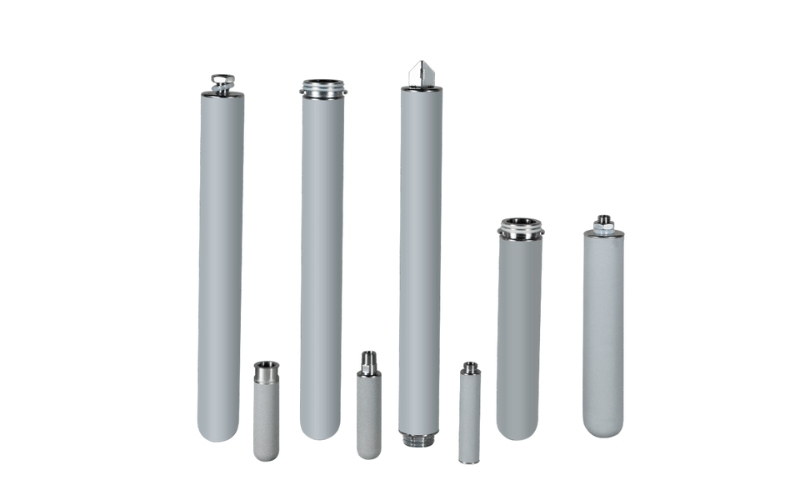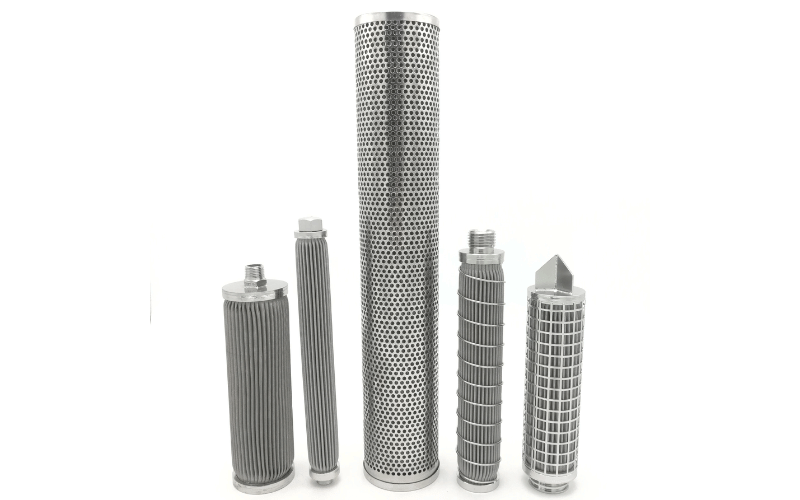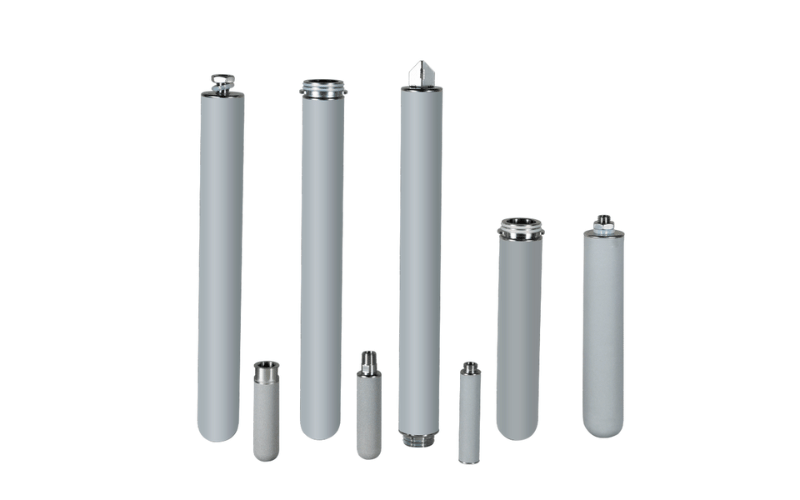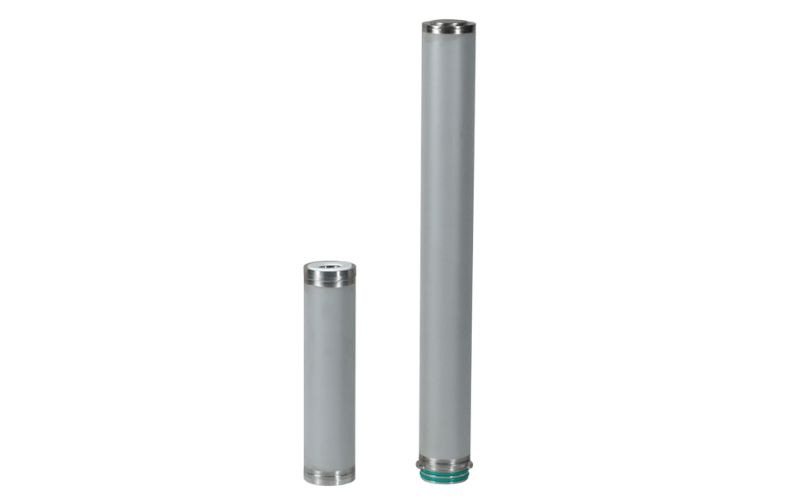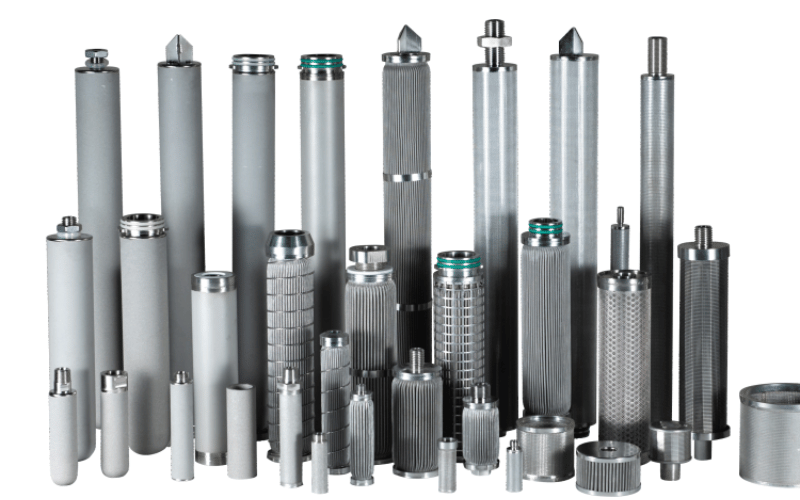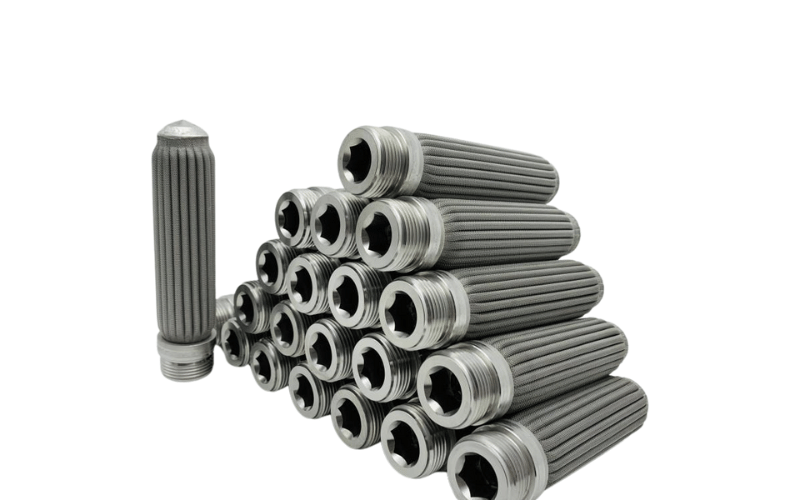Sintered Filter Cartridge
Home » Water Filter Cartridge » Sintered Filter Cartridge
Efficient Filtration | Long Service Life | Customizable Options
Our stainless steel sintered filter cartridges are crafted through high-temperature sintering of five or more layers of stainless steel wire mesh or by folding stainless steel wire mesh into a single layer. This meticulous process ensures exceptional permeability, strong contaminant retention, and an expanded filtration area. With a long service life, superior resistance to high temperatures and corrosion, as well as easy washability and reusability, our cartridges are trusted across various industries, including petroleum, chemicals, and more.
Performance Features
- Shape stability, high strength (pressure resistance up to 50 bar);
- High filtration precision (0.5 μm);
- High-temperature resistance (operable at 500°C);
- Strong corrosion resistance;
- High impact resistance and ability to withstand alternating loads;
- Excellent air permeability and separation efficiency;
- Effective backwashing performance and easy regeneration of components, etc.
Technical Specifications
| Options | Parameter |
|---|---|
| Product Characteristics | Stainless steel cartridge |
| Material | Stainless Steel |
| Cartridge Type | Sintered cartridge |
| Applicable range | Oil tank |
| Usage | Solid-liquid separation |
| Applicable objects | Liquid |
| Working temperature | 500℃ |
| Filtration precision | 1-3200 |
| Performance | High temperature/low temperature/fireproof/waterproof |
| Wire diameter | 0.1-10mm |
| Hole diameter | 0.15-10mm |
| Showing 11 to 11 of 11 entries |
Specifications and Customization Options
Sintered Filter Cartridges can be customized with various interfaces via welding or sintering as required. Common outer diameters include Φ20, 25, 30, 40, 50, 60, 70, 80, 90, 100, and 140 mm. Lengths range from 50 to 1500 mm, with lengths exceeding 1500 mm available via welding. Special specifications can be customized upon request.
Application fields
- Catalyst filtration;
- High-temperature gas filtration;
- Mother liquor recovery filtration;
- Filtration in food and beverages;
- Boiling vaporization bed;
- Liquid injection and gas bubbling, etc.
What is a Sintered Metal Filter Cartridge?
A sintered metal filter cartridge is a durable and efficient filtration solution made by sintering powdered metals like stainless steel at high temperatures. This process creates a porous structure that combines mechanical strength with precise filtration, making it ideal for industrial and environmental applications.
How Does a Sintered Filter Work?
Sintered filters use their porous structure to trap particles while allowing fluids or gases to pass through. Key features include:
- Particulate Capture: Tailored pore sizes ensure precise retention of unwanted particles.
- Diffusion: Even distribution of fluids or gases maintains consistent flow.
- Backflushing Capability: Many filters support reverse cleaning to restore performance and extend usability.
What Materials Are Used?
Our sintered metal filters are crafted from high-performance materials to suit specific applications:
- Stainless Steel: Corrosion-resistant and versatile for various fluids and gases.
- Bronze: Durable and ideal for lighter-duty applications.
- Nickel & Alloys: Resistant to acids and high temperatures.
- Hastelloy: Handles aggressive chemicals in extreme conditions.
- Titanium: Lightweight and corrosion-resistant for specialized uses.
Benefits of Sintered Cartridges
- Durability: Withstands high pressures, extreme temperatures, and corrosive environments.
- Precise Filtration: Uniform pore structure ensures consistent particle retention.
- Easy Maintenance: Backflushing and robust construction allow for repeated cleaning.
- Versatility: Suitable for industries like pharmaceuticals, water treatment, and gas purification.
- Sustainability: Reusable and recyclable, reducing waste and supporting eco-friendly practices.
Our sintered metal filter cartridges deliver precision, reliability, and long-term value, making them essential for efficient filtration systems. Contact us today for expert guidance and tailored solutions!
Applications of Sintered Metal Filter Cartridges
Sintered metal filter cartridges are versatile, durable, and designed to meet the demanding filtration needs of various industries. Their robust construction and precise filtration capabilities make them indispensable in challenging environments.
Where Are Sintered Metal Filter Cartridges Used?
These cartridges excel in a wide range of applications, including:
- Gas Filtration: Removing particulates and impurities in energy production and petrochemical processing.
- Liquid Filtration: Filtering contaminants in water treatment, hydraulic systems, and coolant filtration.
- Aerospace and Defense: Ensuring system performance by filtering hydraulic fluids, fuel, and air in extreme conditions.
- Chemical Processing: Protecting sensitive processes by filtering aggressive chemicals and preventing contamination.
Industries That Benefit from Stainless Steel Sintered Filters
Stainless steel sintered filters are highly valued for their corrosion resistance, thermal stability, and strength. Key industries include:
- Pharmaceutical and Biotechnology: Ensuring sterility and purity in drug production and bioprocessing.
- Oil and Gas: Withstanding harsh conditions during extraction, refining, and distribution.
- Food and Beverage: Meeting hygiene standards by filtering liquids, gases, and steam.
- Semiconductor Manufacturing: Providing ultra-fine filtration to prevent contamination in specialized processes.
- Environmental Engineering: Supporting sustainability by cleaning water and filtering emissions.
How Do Sintered Mesh Filters Improve Filtration?
Sintered mesh filters enhance filtration processes through:
- Consistent Flow and Retention: Uniform pore distribution ensures precise particle retention and uninterrupted flow.
- Reusability and Durability: Withstand repeated cleaning cycles, including backflushing, for extended service life.
- Enhanced Efficiency: Reduce downtime caused by filter failures, ensuring seamless operations in high-pressure or high-temperature environments.
By leveraging the unique properties of sintered metal filter cartridges, we deliver solutions that meet the highest standards of performance, durability, and efficiency. Contact us today for expert guidance on selecting the ideal cartridge for your application!
How to Choosing the Right Sintered Filter Cartridge?
Selecting the right sintered filter cartridge is essential for achieving optimal filtration performance and long-term reliability. Here are the key factors to consider:
Key Factors to Consider
- Application Environment: Match the material (e.g., stainless steel, Hastelloy, titanium) to operating conditions like temperature, pressure, and chemical exposure.
- Contaminant Type and Size: Choose the appropriate pore size based on the particles or impurities to be filtered.
- Flow Rate Requirements: Ensure the cartridge can handle the required flow rate without causing pressure drops.
- Cleaning and Maintenance: Opt for reusable cartridges with backflushing capabilities to reduce maintenance costs.
- Regulatory Standards: Ensure compliance with industry-specific standards for hygiene, safety, and purity.
How Pore Size Impacts Filtration
- Particle Retention: Smaller pore sizes trap finer particles for precision filtration, while larger sizes are ideal for pre-filtration.
- Pressure Drop: Balance pore size with flow rate to avoid excessive pressure drops.
- Customization: Tailored pore sizes meet specific application needs, from chemical processing to potable water treatment.
Why Diameter Matters
- System Compatibility: Ensure the cartridge fits your filtration unit to prevent bypassing or leakage.
- Filtration Surface Area: Larger diameters increase surface area, improving contaminant retention and reducing blockages.
- Flow Dynamics: Proper sizing maintains consistent flow rates and reduces strain on the system.
By carefully considering factors like pore size, diameter, and material, you can select a sintered filter cartridge that meets your system’s unique demands. Contact us today for expert guidance and tailored recommendations!
Maintenance and Care for Sintered Metal Filters
Proper maintenance extends the lifespan and efficiency of sintered metal filter cartridges, ensuring consistent performance. Here’s how to clean, inspect, and replace your filters effectively:
How to Clean a Sintered Metal Filter Cartridge
Regular cleaning is essential for maintaining filtration efficiency. Recommended methods include:
- Backflushing: Reverses fluid flow to dislodge trapped particles, restoring capacity without damage.
- Ultrasonic Cleaning: Uses sound waves to remove fine particulates, ideal for precise filters.
- Chemical Cleaning: Dissolves grease or residues with compatible cleaning solutions.
- Thermal Cleaning: Burns off stubborn debris in controlled environments (if applicable).
After cleaning, rinse thoroughly, allow the filter to dry, and reintegrate it into the system. Establish cleaning intervals based on operating conditions.
Signs of Wear in a Sintered Filter
Monitor your filter for these signs to prevent system issues:
- Reduced Efficiency: Increased contaminants or inconsistent performance.
- Higher Pressure Drops: Indicates clogging or nearing the end of service life.
- Visible Damage: Cracks, dents, or deformation from high pressures or temperatures.
- Persistent Fouling: Cleaning fails to restore performance, signaling wear beyond recovery.
Routine inspections help identify these issues early, avoiding downtime and costly repairs.
When to Replace a Metal Filter Cartridge
Replacement frequency depends on the operating environment and usage. General guidelines include:
- Application-Specific Lifespan: Standard liquid filtration cartridges can last years, while harsh environments may shorten lifespan.
- Performance Decline: Replace if efficiency or pressure drops persist despite cleaning.
- Manufacturer Guidelines: Follow recommended service intervals for optimal performance.
Keep spare cartridges on hand to minimize downtime in critical processes.
By following these maintenance practices, you can maximize the life and performance of your sintered metal filter cartridges. Contact us today for expert guidance on cleaning, replacements, or troubleshooting!
Comparing Sintered Filters to Other Filter Types
Sintered filters stand out for their durability, precision, and adaptability, making them a preferred choice for demanding applications. Here’s how they compare to other filter types:
Sintered Filters vs. Polymer Filters
- Durability: Sintered filters withstand high temperatures and pressures, while polymer filters degrade in extreme conditions.
- Chemical Resistance: Metal filters outlast polymer filters when exposed to harsh solvents, acids, or alkalis.
- Reusability: Sintered filters are reusable and easy to clean, while polymer filters are typically disposable.
- Precision Filtration: Sintered filters offer consistent performance for fine particle removal, unlike polymer filters, which may lack rigidity for ultra-fine filtration.
Sintered Filters vs. Mesh Filters
- Filtration Mechanism: Sintered filters have a uniform porous structure for precise particle retention, while mesh filters rely on woven layers with less consistent openings.
- Mechanical Strength: Sintered filters handle higher pressures and stresses without distortion, unlike mesh filters, which are more prone to damage.
- Cleaning and Maintenance: Sintered filters endure rigorous cleaning methods, while mesh filters may not withstand high-pressure backflushing.
- Applications: Sintered filters excel in high-temperature, high-pressure, and chemical-exposure environments, while mesh filters are better for basic liquid-gas separation or larger particle retention.
When to Choose Sintered Filters
Sintered filters are the superior choice for:
- Harsh Conditions: Extreme temperatures, high pressures, or aggressive chemicals.
- Precision Needs: Industries like pharmaceuticals, oil refining, or water treatment requiring consistent particle removal.
- Sustainability: Reusable and eco-friendly, reducing waste compared to disposable filters.
- Long-Term Cost Efficiency: Durable and reusable, reducing replacement and maintenance costs over time.
By understanding these differences, you can select the most effective filtration solution for your needs. Contact us today for expert guidance and tailored recommendations!
Sintered Filter Cartridge FAQs
Q: What is a stainless steel sintered filter cartridge?
A: A stainless steel sintered filter cartridge is a type of filtration element made from sintered metal powder or fibers. It is designed to provide high filtration efficiency and is often used in various applications due to its durability and resistance to high temperatures.
Q: How does a sintered powder filter work?
A: A sintered powder filter works by using a porous structure created through the sintering process, which fuses metal particles together. This creates a network of interconnected pores that allows liquids or gases to pass through while capturing contaminants and particulates of various sizes.
Q: What are the advantages of using an ss sintered filter?
A: The advantages of using an ss sintered filter include high chemical resistance, the ability to withstand high temperatures, durability, reusability, and the capability to filter fine particulates, making it suitable for a wide range of applications in filtration systems.
Q: What materials are typically used to manufacture stainless steel filter cartridges?
A: Stainless steel filter cartridges are typically made of alloys such as 304 and 316 stainless steel. These materials provide excellent corrosion resistance and mechanical strength, making them ideal for various industrial applications.
Q: What is the significance of micron ratings in sintered metal filters?
A: Micron ratings indicate the size of particles that a filter can effectively remove. For instance, a sintered metal filter with a 0.5 micron rating can capture particulates as small as 0.5 microns, making it suitable for fine filtration applications.
Q: Can you explain the difference between pleated sintered filters and disc filters?
A: Pleated sintered filters have a larger surface area due to their pleated design, which enhances filtration capacity and efficiency. In contrast, sintered metal filter discs are flat and typically used in applications requiring a specific shape or size for installation.
Q: How do sintered metal fiber felt and stainless steel wire mesh compare as filter elements?
A: Sintered metal fiber felt offers fine filtration capabilities with high permeability, making it suitable for capturing small contaminants. Conversely, stainless steel wire mesh is more robust and is often used for coarser filtration, providing structural support and durability.
Q: What applications are best suited for using a sintered metal filter cartridge?
A: Sintered metal filter cartridges are best suited for applications requiring high-temperature filtration, chemical processing, water treatment, and any situation where fine filtration is needed to remove contaminants from liquids or gases.
Q: How do I select the right filter for my application?
A: To select the right filter for your application, consider factors such as the type of fluid being filtered, the size of contaminants, required flow rates, temperature, and chemical compatibility. Consulting with filtration specialists can also help you choose the appropriate stainless steel sintered filter cartridge for your needs.


